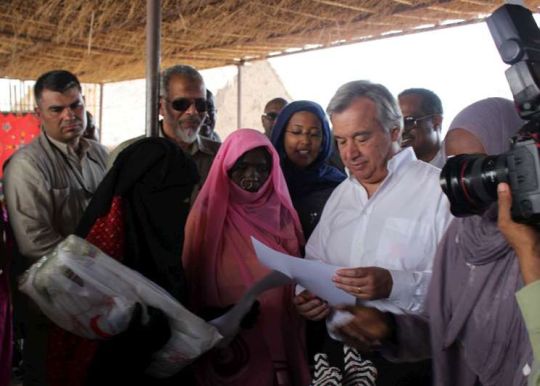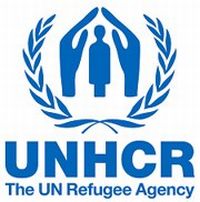UN agency seeks solution for long-term refugees in eastern Sudan
UN agency seeks solution for long-term refugees in eastern Sudan
 High Commissioner António Guterres with Eritrean and Ethiopian refugees in Shagarab I camp, eastern Sudan. Photo: UNHCR/A.Awad
High Commissioner António Guterres with Eritrean and Ethiopian refugees in Shagarab I camp, eastern Sudan. Photo: UNHCR/A.Awad
The head of the United Nations refugee agency has praised efforts to find a lasting solution for tens of thousands of long-term refugees in eastern Sudan, most of them Eritreans, but voiced concern over the vulnerability of the younger ones to human trafficking.
“Our refugee programme in Sudan is one of the oldest in Africa, at 45 years,” said António Guterres, the UN High Commissioner for Refugees, at a news conference in the Sudanese capital, Khartoum, yesterday at the end of visits to South Sudan and Sudan that started last weekend.
“Since then, the [Sudanese] Government has been hosting refugees from many countries generously,” said Mr. Guterres, acknowledging the strain that host communities in eastern Sudan have experienced after accommodating refugees for decades.
We are prepared to support the Government to crack down on the smugglers and to protect the victims.
He said his agency, the UN High Commissioner for Refugees (UNHCR), would launch an initiative to help the long-term refugees to become more self-reliant through setting up income-generating schemes, while supporting development projects for the host communities.
The so-called transitional solutions initiative will be supported by the Sudanese Government and jointly implemented by UNHCR, the UN Development Programme (UNDP) and the World Bank.
Earlier on Thursday, Mr. Guterres visited Kassala in eastern Sudan which hosts more than 86,000 refugees, many of whom fled conflict between Eritrea and Ethiopia half a century ago. The majority of refugees there were born in camps in Sudan, and share the culture and language of the host community. At Shagarab I camp, Mr. Guterres met with refugee women who have benefited from a micro-credit scheme funded by UNHCR.
Every month, some 2,000 asylum-seekers reach the camp, mostly single young men from Eritrea. Some come to escape military conscription, while others are motivated by a possibility of a better life elsewhere, according to UNHCR. Many stay in the camps for a couple of months before joining smuggling networks that transport them to Khartoum, the Middle East or Europe.
“It’s painful to see so many young people become victims of trafficking and kidnapping. Some are even killed. We are prepared to support the Government to crack down on the smugglers and to protect the victims,” said Mr. Guterres.
He also addressed issues of the future of an estimated 700,000 South Sudanese who are still in Sudan after their country seceded in July last year. Some 110,000 of them have so far been registered to return to South Sudan, but are stranded in Khartoum and other areas due to a lack of funds, transportation and security.
“Both governments have agreed to a bilateral plan of action, which we hope will be established in the near future to allow for a more effective return to the south. This will involve air movements for the most vulnerable people, but the opening up of safe convoys by land will be most crucial,” Mr. Guterres added.
###
About the Office of the United Nations High Commissioner for Refugees (UNHCR)

The Office of the United Nations High Commissioner for Refugees was established on December 14, 1950 by the United Nations General Assembly. The agency is mandated to lead and co-ordinate international action to protect refugees and resolve refugee problems worldwide. Its primary purpose is to safeguard the rights and well-being of refugees. It strives to ensure that everyone can exercise the right to seek asylum and find safe refuge in another State, with the option to return home voluntarily, integrate locally or to resettle in a third country. It also has a mandate to help stateless people.
In more than six decades, the agency has helped tens of millions of people restart their lives.
Today, a staff of some 7,685 people in more than 125 countries continues to help some 33.9 million persons.
###
About United Nations Development Programme (UNDP)

Since 1966, the United Nations Development Programme (UNDP) has been partnering with people at all levels of society to help build nations that can withstand crisis and drive and sustain the kind of growth that improves the quality of live for everyone. UNDP works in four main areas: poverty reduction and achieving the Millennium Development Goals (MDGs); democratic governance; crisis prevention and recovery; environment and sustainable development.
UNDP is the United Nations’ global development network, an organization advocating for change and connecting countries to knowledge, experience and resources to help people build a better life. We are on the ground in 177 countries, working with them on their own solutions to global and national development challenges. As they develop local capacity, they draw on the people of UNDP and our wide range of partners.
World leaders have pledged to achieve the Millennium Development Goals, including the overarching goal of cutting poverty in half by 2015. UNDP’s network links and coordinates global and national efforts to reach these Goals.
Our focus is helping countries build and share solutions to the challenges of:
- Fighting poverty
- Building democratic societies
- Preventing crisis, enabling recovery
- Protecting the environment
- Halting & reversing HIV/AIDS
- Empowering women
- Growing national capacity
UNDP helps developing countries attract and use aid effectively. In all our activities, we encourage the protection of human rights, capacity development and the empowerment of women.
More at: www.undp.org
###
> United Nations (UN).
 The United Nations was established on 24 October 1945 by 51 countries committed to preserving peace through international cooperation and collective security. Today, nearly every nation in the world belongs to the UN: membership totals 192 countries.
The United Nations was established on 24 October 1945 by 51 countries committed to preserving peace through international cooperation and collective security. Today, nearly every nation in the world belongs to the UN: membership totals 192 countries.
When States become Members of the United Nations, they agree to accept the obligations of the UN Charter, an international treaty that sets out basic principles of international relations. According to the Charter, the UN has four purposes:
- to maintain international peace and security;
- to develop friendly relations among nations;
- to cooperate in solving international problems and in promoting respect for human rights;
- and to be a centre for harmonizing the actions of nations.
###
* The above story is adapted from materials provided by United Nations (UN)
** More information at United Nations (UN)



















